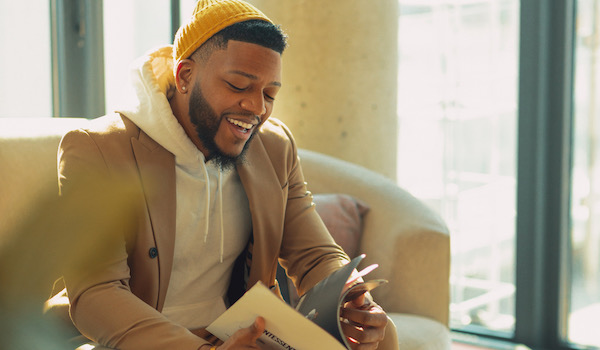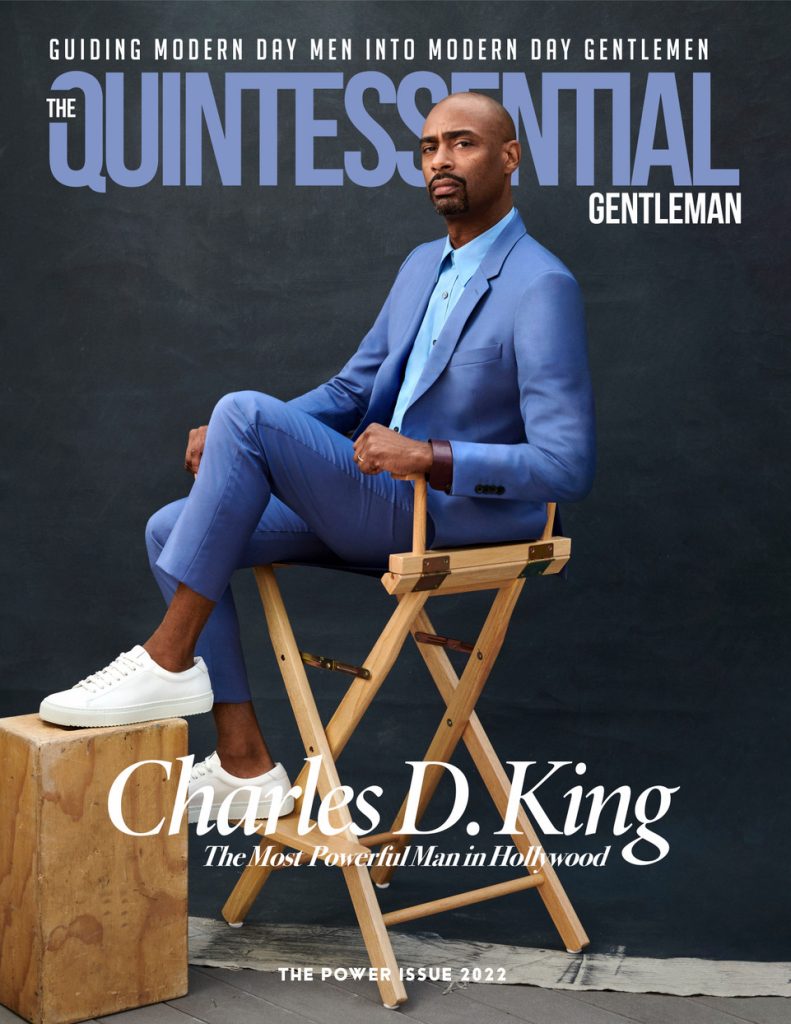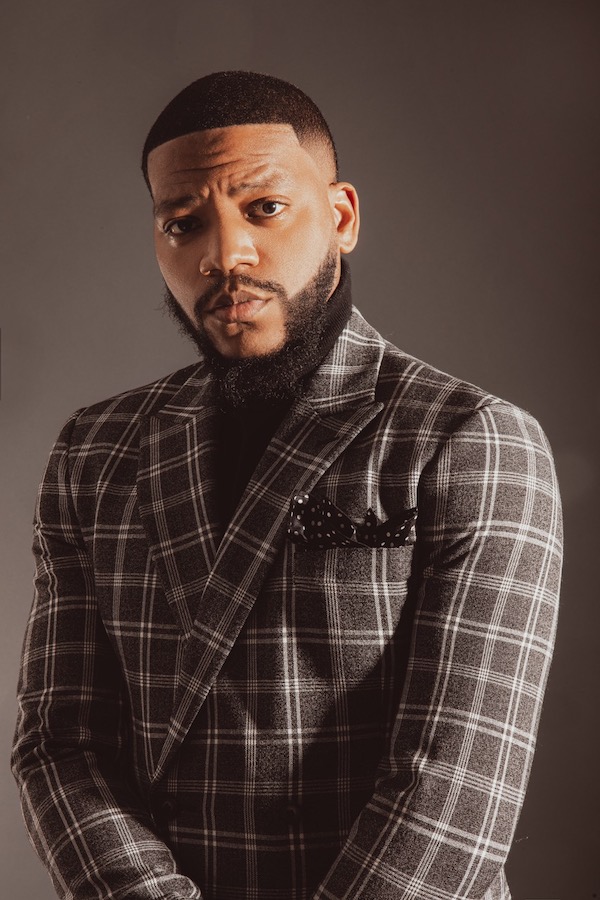Eric K. Thomas of “The Quintessential Gentleman” on Creating a New Kind of Space for Black Men
Eric K. Thomas was about to go to law school when an internship at a radio station gave him his first taste of the entertainment industry.
“I was like, before I cut this check [for law school] in terms of student loans, let me see if this is something that I actually wanted to do.”
What Thomas actually wanted to do, he found out, was create a space for Black men he didn’t see anywhere else online or on the magazine racks. After graduating college and spending four years in Miami, where Thomas did a radio internship, he moved to Atlanta, where he interned with a celebrity publicist. It turned out to be a fortuitous time and place for him. Thomas saw Black men and women succeeding firsthand, but he wasn’t seeing that reflected as much in the media landscape. “Atlanta really showed me that Black people could own businesses and excel, so I feel like the entrepreneurial part really exploded when I was in there.”
Thomas unleashed his entrepreneurial spirit after he moved to New York, creating The Quintessential Gentleman, an outlet that would provide a space unlike any other on the media landscape. Beginning as a blog in 2016, QG has grown into a media platform with a quarterly magazine, a vibrant website, merchandise, and partnerships. It has also profiled some leading lights in the entertainment industry, including Judas and the Black Messiah producer Charles D. King.
Today, Thomas is on hand at the New York Latino Film Festival, with QG producing the fest’s Futuro Digital Conference. Before the festival kicked off, we got a chance to speak with him about creating the platform, the changing media landscape, and why he feels hopeful about the conversations Black men are having today.

What was the initial incarnation of the QG like?
It started as a blog. I wanted to create a place where Black men were being celebrated. There were other publications and media platforms that would dabble a little bit in that area. They’d do a profile, they’d highlight a business, but I didn’t see anything that just really spoke to Black men that was outside of the fashion perspective. It was really about us creating this space of community.
You eventually created not only a vibrant website but a quarterly magazine at a time when many magazines were folding or shrinking. Can you talk to me a bit about that?
For me, I just felt like there were not many magazines that I saw with people I identified with. We work really hard on the design and look of it, so it could really be like a coffee table book. The conversations we have can be topical, things happening at that moment, but they’re also evergreen. Conversations that you could read ten years from now and will still make sense. So we have the print magazine aspect, and we also have the digital version. A lot of people really just want to flip through the pages. The magazine is also promotional for us. We’re a media platform, and the magazine is a component of that. It’s print to order, so if you want the magazine, you can order it right there, and we’ll ship it to your house. These are like books, you can always keep them on the table where they look great.
How do you channel your interests and your team’s interests when you’re deciding who to profile?
We’ve broken down the foundational pillars of the magazine and the site. We have four magazines a year, and our content is broken down into four subsets; power, culture, style, and family. Normally, when we’re having conversations, getting pitches, or reaching out to people to be included in our magazine or featured on the site, it’s always with one of those categories in mind. So we had Judas and the Black Messiah producer Charles D. King on the cover of our Power Issue. We want to have a conversation like, ‘What’s it like to be in a writer’s room?’ I’m a big film buff and TV lover, but I want to know, ‘What’s it like to be a producer?’ Everyone understands the talent, but there are so many components that happen before that person gets on the set, and the conversations that go on from a business perspective for TV and film aren’t promoted enough. Yes, we get the celebrities who get all the glory, but I want to know the person who was in the writing room for Insecure and now has his own show. We like to focus on the people who don’t get as much attention. There are more people like Charles D. King than there are going to be like Michael B. Jordan.

Your Culture, Style, and Family pillars also show Black men in a different light.
When we talk about our Culture issue, we’re talking about our culture as Black men. What are the things that we like? The lifestyle we choose? Who’s moving the culture forward? For our Style Issue, of course, it’s about making sure we look good. The Family Issue is a really big pillar for me because when I created QG, one of my biggest focuses was showing Black fathers. There’s been a depiction in the media that Black fathers are not in their child’s life, and that’s not the case. My mother and father just had their wedding anniversary in June, so making sure we depict that, having articles about Black fathers, showing images of them with their children, loving their children, that’s so important to us.

You’re also fostering conversations on QG that we weren’t seeing when you started the blog, which was only six years ago. Can you talk about that?
Another big piece for us is this new idea of a man. I think the world has changed, and I think Black men have been able to live as themselves, to live authentically, whatever that means to them. Maybe that’s them being emotional, vulnerable, or just excited. Or maybe that means to be with another man if they choose to. We’re more progressive, and we’re trying to produce content that speaks to a wide variety of Black men. Back in the day, it was, ‘This is who the Black man is.’ I wanted to cut through that and show there are many different kinds of Black men.
Do you feel like there’s been a significant change in the way Black men are covered in the media now?
Yeah, there’s been a huge change. For Black men, what I love, love, love is the conversations around mental health. The conversations around vulnerability. The conversations you wouldn’t even have with your best friend back in the day. I’m blessed to have such good friends, and they’ve helped me grow as a man because there are conversations I now have with them that I wouldn’t have had with anyone before. Now, I’m not afraid of being judged, and I don’t feel like I’m the only one going through this.
You’ve seen this with professional athletes now, too, talking about mental health, their struggles with pressure, expectations, racism, and more.
That’s ultimately the space I want to create; a safe space for Black men for them to feel like their authentic selves. I don’t feel like Black men in the past have been able to be authentic or themselves. In order to survive, you had to have this exterior, not show any weakness, because of the things that we’ve been through. Not that everything’s roses now, but there are components of our lives that have changed that allow us to get the help that we need, even conversations about therapy. Therapy is really a person helping you figure out your own issues and asking you the questions that allow you to dive deeper. And to be able to say, ‘Yeah, I go to therapy,’ and it’s not taboo. Now, we have the issue that there are not enough therapists that look like us, so we want to make sure there are enough people to help those seeking it. I think QG has a lot of things we want to do, like not only talking about mental health but to provide the resources to help people. Look at the younger demographic. They’re dying at an alarming rate from suicide, and I don’t think we talk about that enough. Specifically young Black boys who, back in my day, couldn’t express themselves and be kids and figure it out later.
What’s been the toughest part thus far in getting QG to this point?
The pandemic, and covering the Black Lives Matter movement that was happening during the pandemic. People could just turn off the news and put their social media away, but my team and I felt a responsibility to share the things that were happening as they were happening and be informative. It took a toll. We constantly had to see people getting shot, these videos coming in, the protests, the injustice. It was tough, but it was our job to see all that. I’d say it was the hardest time for QG.
What’s next for you and The Quintessential Gentleman?
I’ve been given the opportunity to be the producer of this year’s New York Latino Film Festival. It is one of the biggest Latino film festivals in the country, and it’s been an amazing experience. QG is producing the Futuro Digital Conference for the third year in a row, so we are excited to get influencers under one roof to share their expertise and learn from each other how to be better content creators. QG is also going to focus on brand partnerships and our community initiatives. Now that we are no longer living in a pandemic, it’s time for us to get back to the basics and hit the market grassroots style.
Featured image: Eric K. Thomas. Photo by J. Monroe/Monroe Media.



